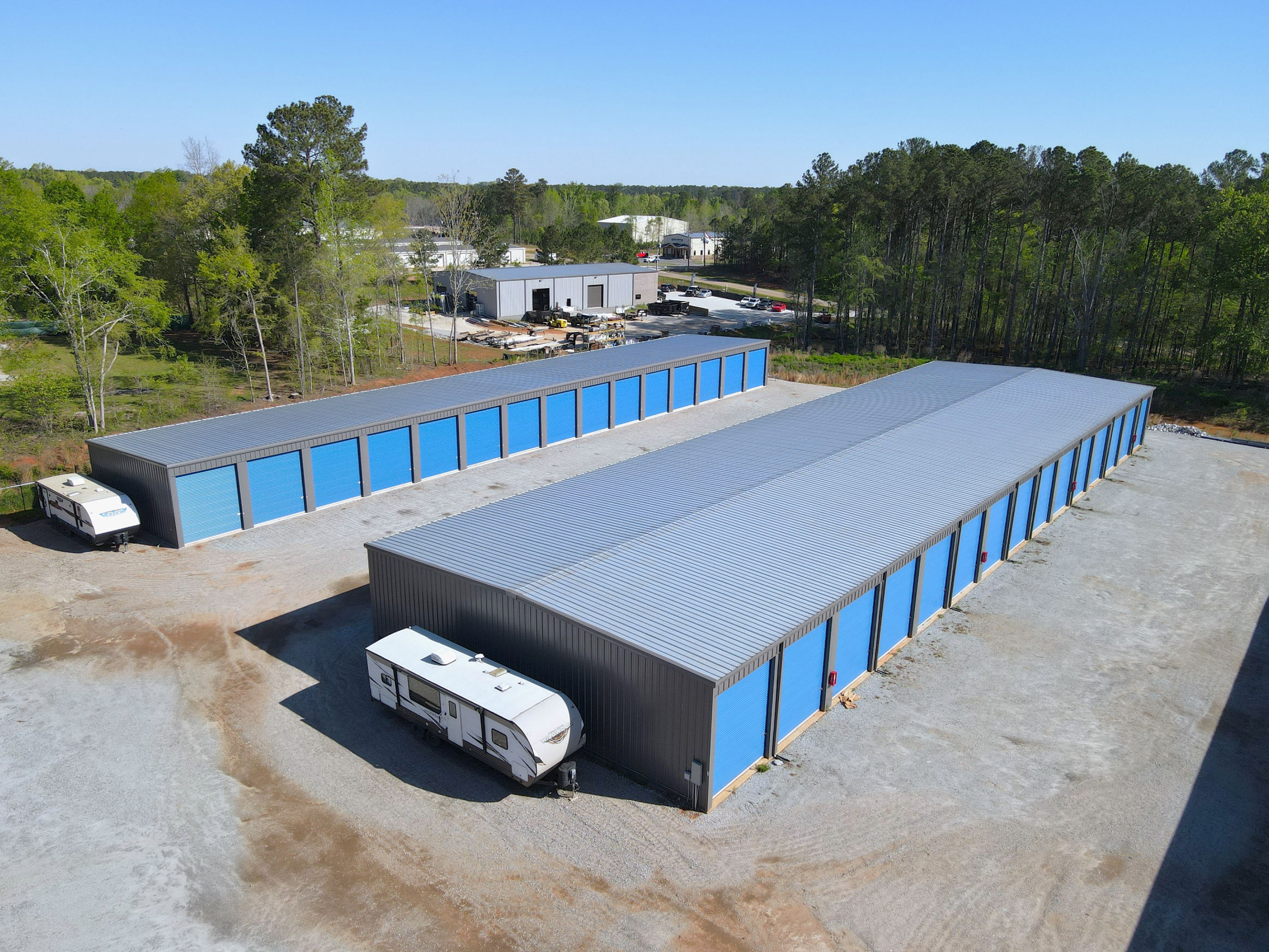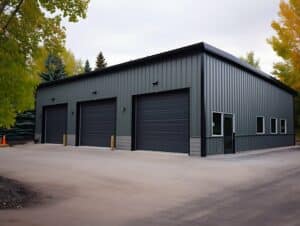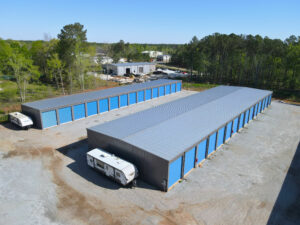Knowing the zoning requirements needed for RV storage facilities and the applicable laws is crucial for a successful and hitch-free business operation.
RV storage facilities are becoming increasingly popular as more people choose to own recreational vehicles. Currently, a record of 11.2 million households own RVs, with younger generations driving the trend.
The US has over 800 completed RV and boat storage properties and in 2022, these properties accounted for $556.1 million in sales. Also, the average price per acre of RV and boat storage properties rose to $661,000 (53.6% year-over-year increase) in 2022.
While growth projection is positive, working with RV storage vehicles require careful consideration of the needed zoning and laws that apply.
Zoning regulations vary depending on the location and type of property, making it crucial for business owners and individuals to understand and navigate these laws effectively.
Table of Contents:
- The Basics of Zoning Laws
- Types of Zoning for RV Storage Facilities
- Navigating Zoning Restrictions for RV Storage
- The Process of Rezoning for RV Storage Facilities
- Legal Considerations for RV Storage Zoning
- Next Steps
- Frequently Asked Questions
The Basics of Zoning Laws
Definition and Importance of Zoning Laws
Zoning laws are regulations implemented by local governments to control land use and development. The primary objective of zoning laws is to ensure that different types of properties are situated in appropriate locations.
Therefore, Zoning helps maintain the integrity and quality of neighborhoods, prevent conflicts between incompatible land uses, and protect the interests of both residents and businesses.
Zoning laws can be traced back to the early twentieth century when cities in the United States started implementing these regulations to address issues such as overcrowding, sanitation, and safety.
Today, zoning laws have evolved to encompass a wide range of considerations, including environmental impact, urban planning, and community aesthetics.
How Zoning Laws Impact RV Storage Facilities
Zoning laws directly impact RV storage facilities as they dictate where these establishments can be located. RV storage facilities typically fall under commercial or industrial zoning categories. It’s crucial to review local zoning ordinances to determine the needed requirements and specific restrictions for RV storage facilities in your area.
When considering the location of an RV storage facility, factors such as proximity to residential areas, access to major roads, and environmental considerations must be taken into account.
Zoning laws may also stipulate requirements regarding the size of the Rv storage, landscaping, and screening to minimize visual impact on the surrounding community.
Did You Know?
Some municipalities have zoning ordinances specifically addressing the storage of RVs, boats, or oversized vehicles. These ordinances may restrict where and how you can store your RV on your own property, even if you’re not operating a commercial storage facility.
Types of Zoning for RV Storage Facilities
When considering the establishment of an RV storage facility, understanding the different types of zoning regulations is crucial. Zoning laws dictate where certain types of businesses can operate, ensuring that land use is appropriate for the surrounding area.
Here, we discuss the three main types of zoning that can impact RV storage facilities.
Residential Zoning and RV Storage
Residential zoning is primarily focused on housing and typically does not permit commercial activities like RV storage facilities within its boundaries.
However, with the growing demand for RV storage, some residential areas may consider rezoning or granting conditional use permits for such facilities. This process can be complex and may involve public hearings and community input to address concerns such as increased traffic or noise levels.
Commercial Zoning and RV Storage
Commercial zoning is more conducive to RV storage facilities as it allows the needed commercial activities. These zones are designed to accommodate businesses like retail stores and service providers, making them a natural fit for RV storage.
However, operators must adhere to specific regulations set by local authorities, including requirements for setbacks from property lines, screening measures to shield neighboring properties, and limitations on operating hours to minimize disturbances.
Industrial Zoning and RV Storage
The Industrial zoning provides the needed range of commercial, manufacturing, and storage operations viable for RV storage facilities. Industrial areas often feature larger lot sizes and fewer restrictions compared to residential or commercial zones, providing ample space for storing recreational vehicles.
Nevertheless, operators must be mindful of potential conflicts with nearby residential communities and address any concerns regarding noise, traffic, or environmental impact to ensure harmonious coexistence.
Navigating Zoning Restrictions for RV Storage
Understanding Zoning Restrictions
Zoning restrictions for RV storage facilities are typically defined in local zoning ordinances. It’s essential to carefully review these regulations to ensure compliance. Key considerations may include lot size requirements, setbacks, screening provisions, and limitations on the number of RVs that can be stored on-site.
In addition to the specific requirements mentioned above, some zoning ordinances may also address issues such as lighting, security measures, and landscaping for RV storage facilities. These additional regulations are aimed at ensuring the safety and aesthetic compatibility of the storage facility within the surrounding area.
Overcoming Zoning Challenges for RV Storage
If your desired location does not conform to existing RV zoning laws or regulations, you may have options to overcome zoning challenges. This may involve seeking a variance, a conditional use permit, or going through a rezoning process.
Consulting with a zoning attorney or professional familiar with local regulations can help navigate these challenges effectively.
Furthermore, community engagement and support can play a crucial role in overcoming zoning challenges for RV storage. Building relationships with local stakeholders, addressing concerns, and highlighting the benefits of a well-maintained RV storage facility can help garner support for zoning modifications or exceptions needed for the project.
The Process of Rezoning for RV Storage Facilities
Rezoning is a crucial step in the development of RV storage facilities, as it involves changing the designated zoning category for a specific property to accommodate such a facility. This process is essential to ensure that the land is used appropriately and in compliance with local regulations and planning guidelines.
One important step in the rezoning process is conducting a thorough analysis of the proposed site to determine its suitability for an RV storage facility. Factors such as access to major roads, proximity to residential areas, and environmental considerations must be taken into account to ensure that the facility will be a good fit for the location.
Steps in the Rezoning Process
The steps for rezoning can vary depending on the local jurisdiction but typically include submitting an application, attending public hearings, and obtaining approval from the appropriate governing body. It is essential to work closely with local planning officials and community stakeholders to navigate the rezoning process successfully.
Engaging with the community early in the process can help address concerns and build support for the rezoning effort. Hosting informational sessions, conducting site visits, and soliciting feedback from residents can help demonstrate the benefits of an RV storage facility and address any potential issues proactively.
Potential Obstacles in Rezoning
Rezoning can be a complex and time-consuming process, often accompanied by potential obstacles that must be carefully managed. These obstacles may include opposition from neighboring residents or businesses, concerns about increased traffic or noise, and compatibility issues with existing land uses. By conducting thorough impact assessments and addressing these concerns transparently, developers can increase the likelihood of a successful rezoning outcome.
Working with experienced land use attorneys and consultants can help navigate the legal and procedural aspects of the rezoning process. These professionals provide valuable guidance to ensure compliance with all regulatory requirements and maximize favorable rezoning decision.
Pro tip:
Even if you find a property that seems perfect for your RV storage facility, there’s no guarantee a rezoning request will be successful. To increase your chances, it’s vital to demonstrate how your project aligns with the community’s long-term development goals.
Legal Considerations for RV Storage Zoning
When considering the zoning regulations for RV storage facilities, it is crucial to understand the potential legal implications of non-compliance. Failure to adhere to the specific zoning requirements can result in a range of serious consequences for the facility owner.
These consequences may include the imposition of hefty fines, the levying of penalties, or even the forced closure. Therefore, it is important for RV storage facility owners to prioritize compliance with zoning regulations and requirements.
Legal Implications of Noncompliance
When it comes to RV storage facilities, zoning regulations play a crucial role. Non-compliance with these regulations can lead to serious legal ramifications, including fines, penalties, or even the shutdown of non-compliant operations. To prevent such consequences, prioritizing compliance is essential. Obtaining the needed permits and approvals is a crucial step in ensuring that RV storage owners adhere to zoning regulations and operate within the boundaries of the law.
Moreover, in addition to the immediate legal ramifications of noncompliance, there may also be long-term effects on business reputation. The business may lose public trust, confidence, customers and revenue if it is guilty of violating the zoning laws.
Therefore, ensuring compliance with zoning regulations is not only a legal necessity but also a crucial aspect of maintaining a successful and sustainable RV storage business.
Seeking Legal Advice for Zoning Issues
When dealing with zoning issues, it’s advisable to seek legal advice from professionals experienced in land use and zoning law. Zoning attorneys can guide navigating the complexities of local regulations, obtaining permits, and addressing any legal challenges that may arise.
Furthermore, legal counsel can assist RV storage facility owners in developing comprehensive strategies to ensure ongoing compliance with zoning laws.
By proactively engaging with legal experts, facility owners can mitigate the risk of potential legal disputes and safeguard business operations. Ultimately, seeking legal advice for zoning issues proactively protects the interests of RV storage facility owners and maintains compliance.

Next Steps
Understanding zoning laws is crucial when establishing and operating an RV storage facility. By familiarizing yourself with different types of zoning and navigating potential restrictions and challenges, you can ensure compliance and create a successful and legally secure business. Remember to consult with professionals and seek legal advice to navigate the intricacies of zoning regulations effectively.
At SteelCo, we assist our clients through every step of complying with the necessary zoning laws. In cases where SteelCo is responsible for drop-shipping materials or erection, we still supply the necessary paperwork for the client to obtain permits that satisfy applicable codes in the project area. Learn more about our comprehensive services.
——————-
Frequently Asked Questions
What is the minimum lot size required for an RV storage facility?
The minimum lot size requirement for an RV storage facility can vary depending on local zoning regulations. Check with the local planning department to determine the specific requirements in your area.
How do I obtain a permit for an RV storage facility?
To obtain a permit for an RV storage facility, submit the needed application to the local planning or building department. The application typically includes detailed plans for the rv storage, as well as proof of zoning compliance and other requirements.
What are the setback requirements for RV storage facilities?
Setback requirements for RV storage facilities vary by jurisdiction. Generally, you need to maintian minimum distances between the facility and neighboring properties, roads, and other structures. These distances ensure safety and minimize any potential impacts on neighboring properties.
What are the types of zoning for RV Storage Facilities?
There are three main types of zoning that impact RV storage facilities: residential, commercial, and industrial. Residential zoning usually doesn’t allow commercial activities like RV storage, but exceptions can occur through rezoning or permits. Commercial zones are more welcoming to RV storage, but require adherence to local rules on setbacks and operations. Industrial zones provide the greatest leeway for RV storage due to minimal restrictions and larger spaces. Though, you need to also consider potential conflicts with surrounding areas.
How do I handle stormwater runoff from an RV storage facility?
You need to manage stormwater runoff from an RV storage facility in accordance with local regulations. Installing stormwater detention ponds, infiltration trenches, or other stormwater management systems to minimize the impact on surrounding environment.
What type of insurance do I need for an RV storage facility?
The needed insurance coverage for an RV storage facility may include general liability insurance, property insurance, and flood insurance. It’s important to consult with an insurance professional to determine the specific coverage needs for your facility.
Can I store my RV on my residential property?
You may be able to store your RV on your residential property, but zoning ordinances may restrict where and how.
Always check with your local zoning office to determine the specific regulations in your area.
What is the process for rezoning for RV storage facilities?
Submitting an application, attending public hearings, and obtaining approval from the appropriate governing body.
It’s essential to work closely with local planning officials and community stakeholders to navigate the rezoning process successfully.
What are the potential obstacles in rezoning for RV storage facilities?
Potential obstacles in rezoning for RV storage facilities include opposition from residents, businesses, and compatibility issues with existing land uses.
Address these concerns transparently and work with experienced land use attorneys and consultants to increase successful rezoning outcome.
What are the legal implications of non-compliance with zoning regulations for RV storage facilities?
Failure to comply with zoning regulations for RV storage facilities can result in fines, penalties, or even the forced closure.
RV storage facility owners must prioritize compliance and obtain all necessary permits and approvals to avoid severe consequences.
























